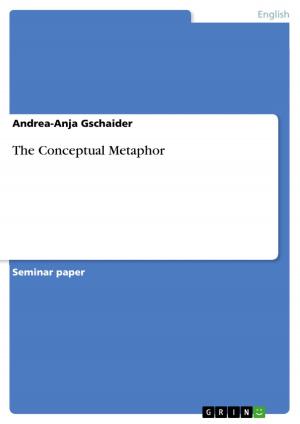William Blake - a literary figure to approach religion
a literary figure to approach religion
Fiction & Literature, Literary Theory & Criticism, British| Author: | Steffen Laaß | ISBN: | 9783638626644 |
| Publisher: | GRIN Publishing | Publication: | March 26, 2007 |
| Imprint: | GRIN Publishing | Language: | English |
| Author: | Steffen Laaß |
| ISBN: | 9783638626644 |
| Publisher: | GRIN Publishing |
| Publication: | March 26, 2007 |
| Imprint: | GRIN Publishing |
| Language: | English |
Seminar paper from the year 2004 in the subject English Language and Literature Studies - Literature, grade: 1, Otto-von-Guericke-University Magdeburg, 13 entries in the bibliography, language: English, abstract: 'We have war, injustice, and unhappiness because our way of life is founded on mistaken beliefs.' This quotation by William Blake set me thinking and distracted me from my actual project: I wanted to write an essay on a poem. But during my work I, fortunately, ended up in a chaos of philosophical questions: Who are we? Where do we come from? Is our universe only a dust particle of something larger? Is there a force guiding us? Who or what is God? From time immemorial, people have been racking their brains over these ageless and puzzling questions, and I doubt whether we are able to provide convincing responses to them. Someone who might give us a wise answer is William Blake (1757-1827). He is considered to be the first major Romantic poet, and a central theme of his works is religion (e.g. The Marriage of Heaven and Hell, The Book of Urizen). Admittedly, there is no easy access to Blake because he is one of the most obscure and inscrutable poets. Nevertheless, I would like to make the daring attempt to uncover the secrets of Blake's religious mysticism. For this reason, I will discuss one of his first works There Is No Natural Religion (1788). My design is to make this essay accessible to a wide readership, especially to those who have so far avoided profoundly dealing with a particular topic: religion. I also had no serious interest in religion at all - until I started to learn Arabic. Once you have mastered 'Allah's difficult but most ornate language', you have got a completely different outlook on the world. Beside this, I felt an urgent personal need to deal with the concept of faith in greater detail. This has in part something to do with the changing idea and role of religion in the 21st century. Unfortunately, a number of armed conflicts have been provoked grounded on disagreements between several religious groups, and since September 11 people fear that a potential third world war will be a war of religions, a war between cultures. So this subject is of utmost relevance to the current events. I hope to provide a vivid, comprehensible and, above all, stimulating and entertaining essay. Keywords that I put in italics serve as a guide through our discussion. So let's begin and explore the (still) unknown spheres of religion. William Blake will give us a hand.
Seminar paper from the year 2004 in the subject English Language and Literature Studies - Literature, grade: 1, Otto-von-Guericke-University Magdeburg, 13 entries in the bibliography, language: English, abstract: 'We have war, injustice, and unhappiness because our way of life is founded on mistaken beliefs.' This quotation by William Blake set me thinking and distracted me from my actual project: I wanted to write an essay on a poem. But during my work I, fortunately, ended up in a chaos of philosophical questions: Who are we? Where do we come from? Is our universe only a dust particle of something larger? Is there a force guiding us? Who or what is God? From time immemorial, people have been racking their brains over these ageless and puzzling questions, and I doubt whether we are able to provide convincing responses to them. Someone who might give us a wise answer is William Blake (1757-1827). He is considered to be the first major Romantic poet, and a central theme of his works is religion (e.g. The Marriage of Heaven and Hell, The Book of Urizen). Admittedly, there is no easy access to Blake because he is one of the most obscure and inscrutable poets. Nevertheless, I would like to make the daring attempt to uncover the secrets of Blake's religious mysticism. For this reason, I will discuss one of his first works There Is No Natural Religion (1788). My design is to make this essay accessible to a wide readership, especially to those who have so far avoided profoundly dealing with a particular topic: religion. I also had no serious interest in religion at all - until I started to learn Arabic. Once you have mastered 'Allah's difficult but most ornate language', you have got a completely different outlook on the world. Beside this, I felt an urgent personal need to deal with the concept of faith in greater detail. This has in part something to do with the changing idea and role of religion in the 21st century. Unfortunately, a number of armed conflicts have been provoked grounded on disagreements between several religious groups, and since September 11 people fear that a potential third world war will be a war of religions, a war between cultures. So this subject is of utmost relevance to the current events. I hope to provide a vivid, comprehensible and, above all, stimulating and entertaining essay. Keywords that I put in italics serve as a guide through our discussion. So let's begin and explore the (still) unknown spheres of religion. William Blake will give us a hand.















